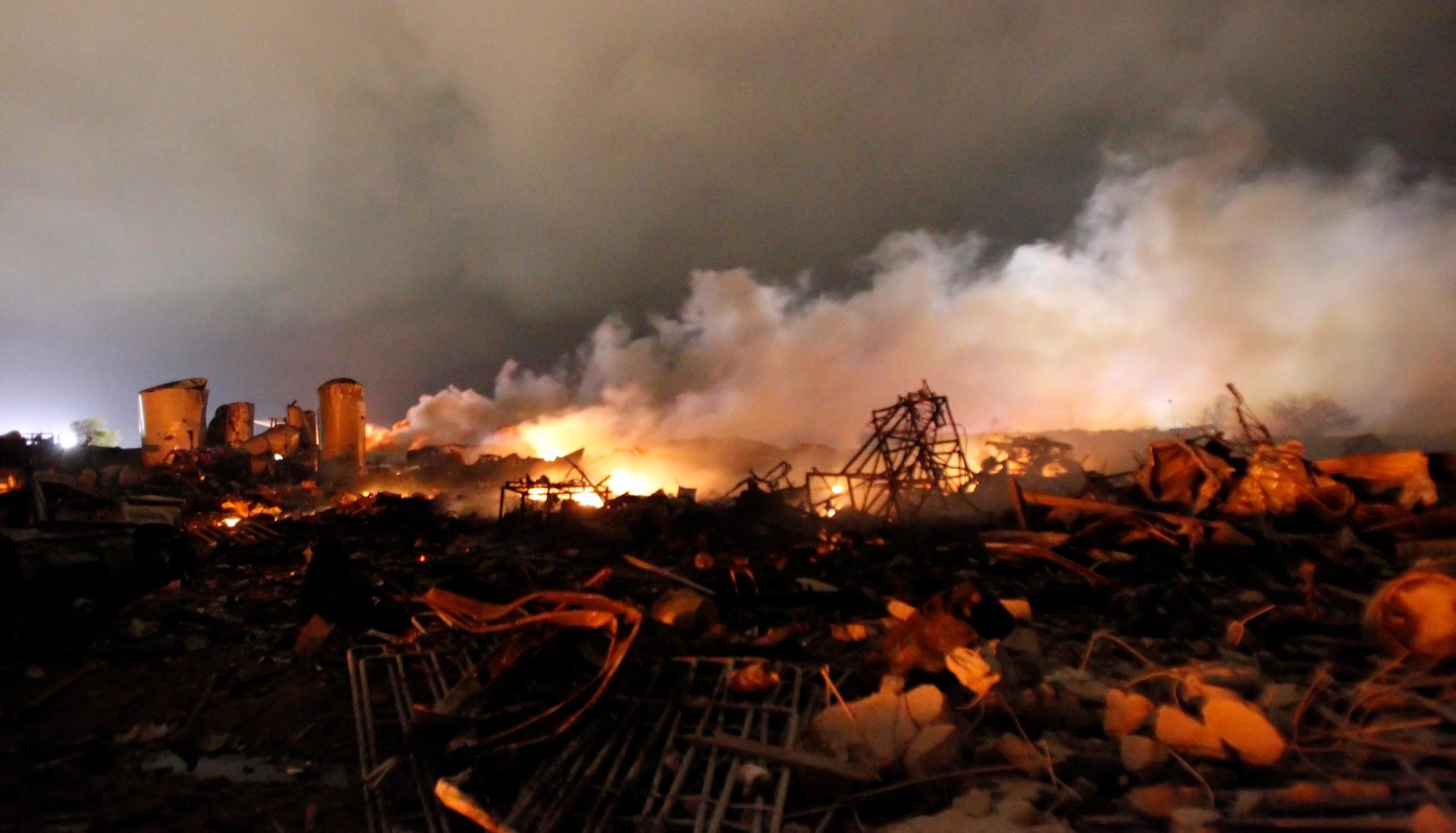Investigation uncovers little regulation of fertilizer plants
The remains of a fertilizer plant burn after an explosion at the plant in the town of West, Texas, early April 18, 2013. The deadly explosion ripped through the fertilizer plant late on Wednesday. (Photo by Mike Stone/Reuters.)
On April 17, a chemical fertilizer plant in the town of West, Texas, blew up and killed 15 people, wounding more than 150.
Nationally, many raised questions about the hazards of chemical plants, particularly those that handle fertilizers. But when a team of reporters at the Dallas Morning News tried to find out how often accidents like the one in Texas occur, they discovered that no regulators are keeping track.
Daniel Lathrop, a staff reporter and data specialist at the Dallas Morning News, said the team thought it was asking a simple question when it started its project: How often do these happen, what were the warning signs, how could this have been prevented.
“The most basic question of that was how often has this happened before? And we couldn’t find out,” he said. “We talked to agencies, and we gathered data, and we increasingly realized that no one knew.”
It turns out there’s no government agency at any level that’s tasked specifcally with collection and analysis of data on chemical storage or processing facilities.
“It’s split between OSHA, the EPA, the Department of Homeland Security, state agencies of various kinds, and often simply left in the hands of local fire marshals and local fire departments,” Lathrop said.
Perhaps more troubling, Lathrop said he and his colleagues had a hard time determining if any government agency really wants the job of monitoring these facilities.
“The environmental groups that we asked suggested that it’s pressure from industry, other experts that we’ve talked to have said that industry certainly has no interest in promoting this, but hasn’t necessarily opposed it either,” Lathrop added.
An EPA official, Lathrop said, suggested that various officials have been interested in the issue, but would lose interest.
As far back as 1986, the Emergency Planning and Community Right to Know Act was passed — in the wake of a huge chemical disaster that killed thousands of people in Bhopal, India, where a Union-Carbide plant exploded — which requires companies to disclose information about dangerous chemicals that they store, and to calculate worst case scenarios so that nearby communities can plan for disaster.
But Lathrop says in the intervening time, a number of roadblocks have been erected that reduce the effectiveness of that legislation.
“There’s been a concerted effort from a variety of sources to make that information hard to get, hard to access,” Lathrop said. “There’s no real data verification or confirmation that goes on with any of what gets reported. Most of it is reported only to state agencies.”
He added that a state agency in Texas admitted it collects the information but said it has no authority to do anything with what it collects.
Interestingly, only certain chemicals are regulated under that law, and the list of chemicals doesn’t include fertilizer, the ammonium nitrate that blew up at the West fertilizer company.
“The ammonium nitrate in federal law and regulation has a very special status, it’s one of a small number of chemicals that not just isn’t regulated, but has special sort of anti-regulatory status where the EPA is prevented from regulating it under some circumstances,” Lathrop said.
It’s illegal, for example, for federal and state and environmental agencies to regulate ammonium nitrate when it is for direct sale to the consumer — typically farmers.
“Ammonium nitrate fertilizer, like the kind that was mixed and sold at West, is, in fact, not required to be dealt with under EPCRA, if it is for direct sale to consumers,” Lathrop said, adding that plant officials did in fact disclose under EPCRA.
Ammonium nitrate, of course, is a fertilizer, but famously it’s quite explosive. The Oklahoma City bombers used it in their bomb.
“We can’t understand why this particular chemical has sort of had regulatory kryptonite,” Lathrop said. “There have been major disasters involving this, either deliberate terrorist attacks or major accidents that have happened.”
But there seems to be no appetite in Washington, D.C., to change that. The EPA had a pilot program in the 1980s that tracked ammonium nitrate fertilizer, but it was deemed not sufficiently successful to continue, Lathrop exlplained.
“I don’t think we can make good decisions as a public. I don’t think that we can set proper regulations on companies. I don’t think that we can make any real decisions if we don’t know what it is that we’re making decisions about,” he said.
